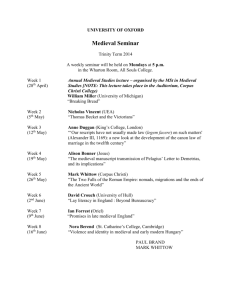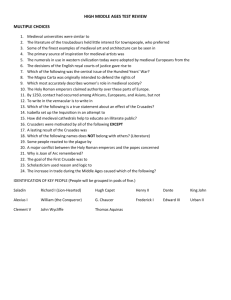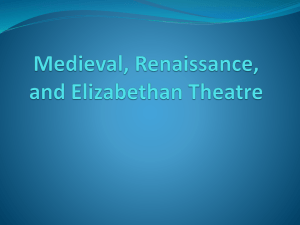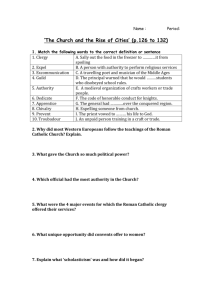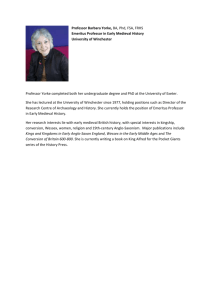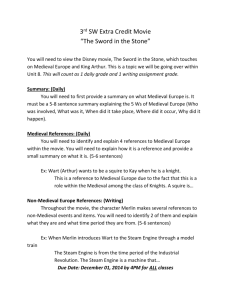(bbnan 03100): elective lecture course * medieval english drama
advertisement
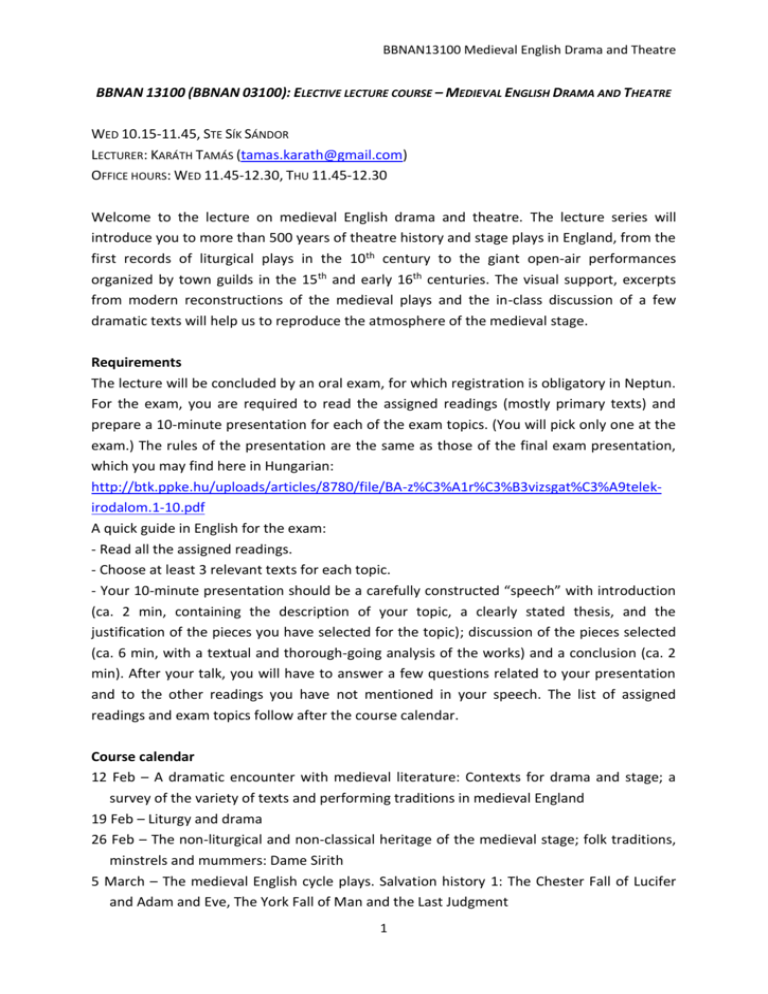
BBNAN13100 Medieval English Drama and Theatre BBNAN 13100 (BBNAN 03100): ELECTIVE LECTURE COURSE – MEDIEVAL ENGLISH DRAMA AND THEATRE WED 10.15-11.45, STE SÍK SÁNDOR LECTURER: KARÁTH TAMÁS (tamas.karath@gmail.com) OFFICE HOURS: WED 11.45-12.30, THU 11.45-12.30 Welcome to the lecture on medieval English drama and theatre. The lecture series will introduce you to more than 500 years of theatre history and stage plays in England, from the first records of liturgical plays in the 10th century to the giant open-air performances organized by town guilds in the 15th and early 16th centuries. The visual support, excerpts from modern reconstructions of the medieval plays and the in-class discussion of a few dramatic texts will help us to reproduce the atmosphere of the medieval stage. Requirements The lecture will be concluded by an oral exam, for which registration is obligatory in Neptun. For the exam, you are required to read the assigned readings (mostly primary texts) and prepare a 10-minute presentation for each of the exam topics. (You will pick only one at the exam.) The rules of the presentation are the same as those of the final exam presentation, which you may find here in Hungarian: http://btk.ppke.hu/uploads/articles/8780/file/BA-z%C3%A1r%C3%B3vizsgat%C3%A9telekirodalom.1-10.pdf A quick guide in English for the exam: - Read all the assigned readings. - Choose at least 3 relevant texts for each topic. - Your 10-minute presentation should be a carefully constructed “speech” with introduction (ca. 2 min, containing the description of your topic, a clearly stated thesis, and the justification of the pieces you have selected for the topic); discussion of the pieces selected (ca. 6 min, with a textual and thorough-going analysis of the works) and a conclusion (ca. 2 min). After your talk, you will have to answer a few questions related to your presentation and to the other readings you have not mentioned in your speech. The list of assigned readings and exam topics follow after the course calendar. Course calendar 12 Feb – A dramatic encounter with medieval literature: Contexts for drama and stage; a survey of the variety of texts and performing traditions in medieval England 19 Feb – Liturgy and drama 26 Feb – The non-liturgical and non-classical heritage of the medieval stage; folk traditions, minstrels and mummers: Dame Sirith 5 March – The medieval English cycle plays. Salvation history 1: The Chester Fall of Lucifer and Adam and Eve, The York Fall of Man and the Last Judgment 1 BBNAN13100 Medieval English Drama and Theatre 12 March – Salvation history 2 - Old Testament Plays: The Chester Noah, Abraham and Isaac 19 March – Salvation history 3 - Nativity Plays: Wakefield Second Shepherd’s Play, The NTown Mary Plays (Trial of Mary and Joseph and the Nativity) 26 March – Salvation history 4 - The Passion and the Resurrection: The York Dream of Pilate’s Wife, Crucifixion, and Resurrection 2 April – Guest lecture 9 April – Modern reconstructions of the medieval mysteries 16 April – Spring break 23 April – Spring break 30 April – Repenting women: The N-Town Woman Taken in Adultery and the Digby Mary Magdalene 7 May – Moralities: Everyman and Mankind 14 May – Miracles: The Croxton Play of the Sacrament Assigned (obligatory) readings for the exam Primary texts (1) From the Chester Mystery Cycle (http://www.reed.utoronto.ca/chester/): The Fall of Lucifer (http://www.reed.utoronto.ca/chester/chester1.pdf) Adam and Eve (http://www.reed.utoronto.ca/chester/chester2.pdf) Noah’s Flood, lines 1-375) (http://www.reed.utoronto.ca/chester/chester4.pdf) The Sacrifice of Isaac, lines 1-268 (http://www.reed.utoronto.ca/chester/chester5.pdf) (2) From the N-Town Cycle (http://homes.chass.utoronto.ca/~ajohnsto/frntmt.html): The Parliament of Heaven and the Annunciation (http://homes.chass.utoronto.ca/~ajohnsto/annuncia.html) The Trial of Mary and Joseph (http://homes.chass.utoronto.ca/~ajohnsto/trial.html) The Nativity (http://homes.chass.utoronto.ca/~ajohnsto/birth.html) The Woman Taken in Adultery (http://homes.chass.utoronto.ca/~ajohnsto/adultery.html) (3) From the Wakefield Cycle The Second Shepherd’s Play (http://lrc.surcollege.net/courses/World%20Literature%20Lectures/The%20Second%20S hepherd%20Play%20EText.pdf OR http://www.calvin.edu/academic/engl/215/ssp.htm) (4) From the York Cycle (http://www.reed.utoronto.ca/yorkplays/york.html) The Fall of Man (http://www.reed.utoronto.ca/yorkplays/York05.html) The Dream of Pilate’s Wife (http://www.reed.utoronto.ca/yorkplays/York30.html) The Crucifixion (http://www.reed.utoronto.ca/yorkplays/York35.html) The Resurrection (http://www.reed.utoronto.ca/yorkplays/York38.html) The Last Judgment (http://www.reed.utoronto.ca/yorkplays/York47.html) 2 BBNAN13100 Medieval English Drama and Theatre (5) Non-Cycle Plays Dame Sirith (http://www.unc.edu/~jwittig/51/sirith.htm) Everyman (http://www.fordham.edu/halsall/basis/everyman.asp) OR Mankind (http://research.uvu.edu/mcdonald/3610/mankind.html) The Croxton Play of the Sacrament (http://machias.edu/faculty/necastro/drama/comedy/sacrament.html with an explanatory trot on: http://www.medievallit.org/course_materials/ltwl172_sp2010/croxtontranslation.htm) Secondary literature Normington, Katie. Medieval English Drama: Performance and Spectatorship. Cambridge: Polity Press, 2009 Further (suggested) readings Beadle, Richard, ed. The Cambridge Companion to Medieval English Theatre. Cambridge: Cambridge University Press, 1995. (Faculty Library shelf-marks: 236:222 (1) and 254:121) Cawley, A. C., ed. Everyman and Medieval Miracle Plays. Everyman, 1959 and 1999. (Faculty Library shelf-marks: 254:509 (1) and 266:502) Happé, Peter. “Introduction” in English Mystery Plays: A Selection. Ed. by Peter Happé. Penguin Books, 1975. (Faculty Library shelf-mark: 313:405) Topics for the exam (1) The comic in medieval English plays (2) Setting in medieval English plays (3) History in medieval English plays (4) Initiations in medieval English plays (5) Community and the individual in medieval English plays (6) Death in medieval English plays (7) Aggression and cruelty in medieval English plays (8) Love in medieval English plays (9) Marriage in medieval English plays (10) Salvation and damnation in medieval English plays Good luck for the course! 3


